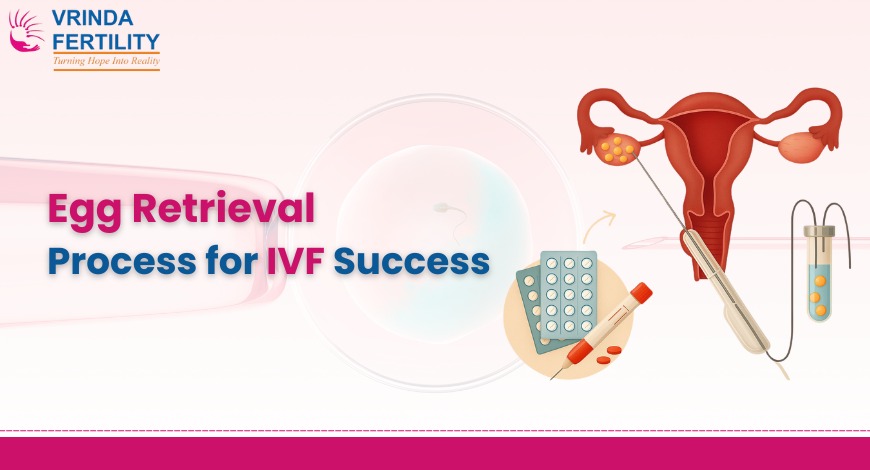Introduction
Egg retrieval is one of the most critical phases in the In vitro fertilization (IVF) process. For those dreaming of starting or expanding their families, understanding this procedure can empower better decisions, reduce anxiety, and increase the chance of success. At Vrinda Fertility, our expertise in fertility care ensures your journey toward parenthood is supported with precision and compassion.
What Is Egg Retrieval in IVF?
Egg retrieval, or oocyte retrieval, is a minimally invasive procedure performed during IVF to collect mature eggs from a woman’s ovaries. It typically occurs 34–36 hrs after the final trigger injection and marks a pivotal point in the IVF timeline. These collected eggs are then fertilized in the lab to create embryos for transfer.
Preparing for Egg Retrieval
Success starts with preparation. Prior to the procedure, fertility specialists assess hormonal levels, ovarian reserve, and overall reproductive health. Ultrasound imaging helps track the number and size of developing follicles. During this stage, maintaining a healthy diet, reducing stress, and following medical instructions strictly can significantly improve outcomes.
Ovarian Stimulation Phase
To maximize egg yield, patients undergo a 10–14 days ovarian stimulation process involving daily hormone injections. These medications encourage the ovaries to produce multiple eggs instead of just one. Throughout this phase, frequent ultrasounds and blood tests monitor follicular growth and adjust medication as needed.
Trigger Shot Timing & Egg Maturity
When follicles reach the optimal size (typically 18–22 mm), a trigger shot is administered. This final injection signals the eggs to mature in preparation for retrieval. The timing of this shot is crucial—missing the 34–36 hour retrieval window could compromise egg quality.
Egg Retrieval Procedure Step-by-Step
Performed under mild sedation or anesthesia, egg retrieval is a short outpatient procedure lasting about 20–30 minutes. Guided by ultrasound, a thin needle is inserted through the vaginal wall into each follicle to gently extract the fluid containing the eggs. The procedure is safe, and most patients return home the same day.
What Happens After Retrieval?
Immediately after collection, the eggs are evaluated in the lab. Only mature eggs are selected for fertilization—either through conventional IVF or ICSI (Intracytoplasmic Sperm Injection), depending on the case. Successfully fertilized eggs are then monitored as they develop into embryos over the next 3–5 days.
Recovery After Egg Retrieval
Mild cramping, bloating, or spotting is common following egg retrieval. These symptoms usually resolve within 24–48 hours. Patients are advised to rest, hydrate well, and avoid heavy activities during this period. A follow-up visit ensures everything is progressing normally before embryo transfer.
Key Factors That Impact Success
Several factors influence IVF success post-retrieval:
- Age: Women under 35 typically have higher success rates.
- Egg Quantity and Quality: An ideal retrieval yields 10–15 healthy eggs.
- Ovarian Reserve: A higher reserve often correlates with better outcomes.
- Clinic Expertise: Success also depends on lab quality and embryologist skill.
Innovations Elevating Egg Retrieval Outcomes
Advancements like AI‑guided trigger timing, enhanced imaging, and precision needle design are revolutionizing how clinics optimize egg collection. These tools help personalize treatment and maximize retrieval efficiency—offering better outcomes with fewer cycles.
Conclusion
Egg retrieval is a defining moment in the IVF journey, bringing hopeful parents one step closer to their dream. With the right preparation, medical support, and timing, this procedure sets the foundation for successful fertilization and embryo development. If you’re considering IVF, consult with the expert team at Vrinda Fertility or join the community at Vrinda Fertility on Facebook to learn more.
Disclaimer: This article is intended for educational and informational purposes only. It is not a substitute for personalized medical advice, diagnosis, or treatment. Always consult with your fertility specialist at Vrinda Fertility and a qualified healthcare provider to receive guidance tailored to your unique health and fertility needs.
Frequently Asked Questions (FAQ)
The egg retrieval process usually takes 20 to 30 minutes. Including check-in, preparation, and recovery time, you can expect to spend about 2 to 3 hours at the clinic.
No, the procedure is performed under mild sedation or anesthesia, so you won’t feel any pain during it. Some women experience mild cramping or bloating afterward, but it typically goes away within a day or two.
Preparation includes fasting the night before, staying well-hydrated the day before, and following your clinic’s medication and trigger shot instructions. Comfortable clothing and arranging transportation home are also important.
The trigger shot is a final hormone injection given 34–36 hours before egg retrieval. It helps the eggs complete their maturation process and ensures they are ready to be collected at the right time.
On average, 10 to 15 eggs are retrieved during one IVF cycle. This number may vary depending on your age, ovarian reserve, and how your body responds to stimulation medications.
Egg retrieval is a safe and routine procedure. It does not cause long-term damage to the ovaries. Minor side effects like temporary cramping or slight spotting are normal and resolve quickly.
Common side effects include light spotting, bloating, mild cramping, and fatigue. These symptoms usually disappear within 24 to 48 hours. Drinking fluids and resting help speed up recovery.
If you’re not going through a fresh embryo transfer, your next period typically arrives 10 to 14 days after the egg retrieval procedure.
Yes. Since the procedure involves sedation, you will not be able to drive afterward. You must arrange for a family member or friend to take you home safely.
You’ll usually be informed about the number of eggs collected shortly after the procedure, once you wake up in the recovery room. Details about egg maturity and fertilization come within the next 24–48 hours.



